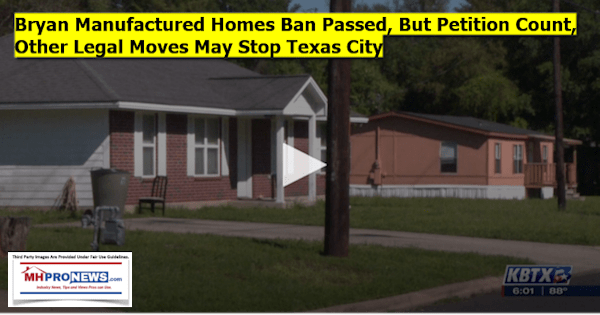
WTAW, Bryan’s website, and locals on the ground tell the Daily Business News on MHProNews that “The Bryan city council voted 5-2 Tuesday night to eliminate future manufactured home placement on individual lots.
Joining Greg Owens, who made the motion, and Buppy Simank, who seconded the motion, were Reuben Marin, Brent Hairston, and Andrew Nelson.
Voting no were Prentiss Madison and Mike Southerland.”
But the battle isn’t over, say locals. As KAGS TV said, a petition count could cause the city counsel vote to be invalidated.
The second local news video provides a different, and in some ways, a stronger take.
But beyond the petition count, there are several other possible legal issues that are pending. Among them are constitutional ones.
A manufactured home retailer in Texas sent the following to MHProNews, about the subject of “unconstitutional takings.”
This will be one of several possible courses of action, per sources, to MHProNews. Let’s dive in.
TMHA Legal Review Unconstitutional Takings

But that is rapidly followed by a not so fast. “Not only is it not legal advice, it isn’t good advice. Why? Because such thinking is based on a gross oversimplification, and while clearly hyperbolic, one can see that even a lesser fashioned reaction is one that won’t generate legitimate consideration from any city official or politician. Worse yet, such a response could solicit a reaction from potential adversaries that you don’t know what you are talking about.”
Why? Says Pendleton, “…this area of the law has been in play at the Supreme Court level for over 100 years. What’s the punchline? The punchline is that despite all the time and all the cases and opinions rendered in this area, to this day no set formula or bright line standard exists as to what constitutes an improper taking, save a physical invasion or a denial of all economic or productive use of the land. And based on the history of the court, it doesn’t appear likely that a clear standard will ever exist.”
What Pendleton does is what attorneys are trained to do, learn to argue from both sides of a question. He says, “…know that this area of law requires argument and there is no clear path to victory. Now we [meaning manufactured home professionals] know this reality. And I would guess competent council for a local government knows it as well.”
Let’s rephrase Pendleton’s point. It isn’t that an unconstitutional taking is necessarily a bad argument. It is that a city attorney or outside counsel knows that this is a fight they too might win. Given no clear path for victory by a property owner or manufactured home professional, a city may be willing to gamble on that your attorney won’t want to risk the cost of the lawsuit.
“Challenges under the takings provisions of the Fifth Amendment and the Equal Protection clause of the Fourteenth Amendment are extremely fact sensitive. So not only do you have to go through an actual incident, it must also be shown to the court that it is “ripe.” All “ripe” means is that a final determination has been made after exhausting all local appeals and other processes or that waiting for such a determination would be futile.”
“For decades courts looked for bright line tests when deciding if some action was a compensable taking by a government actor. The Supreme Court has provided such a test in only two situations. The first is when there is a permanent physical occupation. The second is when there is a denial of all economically viable use,” said Pendleton.
“Many of the cases I’m going to mention actually involved manufactured home communities. However, if the case and opinion refer to the community as a “mobile home park” I use that term below. This is not in an effort to be derogatory. Far from it. But I use it to provide consistency with the court opinions being referenced and in some cases to provide the appropriate time stamp in history when a specific case was heard. So please, don’t get offended by the term rather than using community.”
Let’s note that this review the Daily Business News on MHProNews is cutting out some of the analogies that Pendelton provided, and is cutting to the meatier parts of his commentary and legal analysis. Let’s note too that in referring to cases in the Ninth Circuit, while interesting, that is also perhaps the most liberal circuit court in the country. As a non-attorney, we simply note that it is not unusual for those cases to get overturned if they hit the Supreme Court.
“The Ninth Circuit actually took up two cases involving mobile home parks. In one case the court analyzed the owners’ claim as one of a taking by physical occupation when a city ordinance required the owner to offer tenant leases of unlimited duration. The court compared the case to the Supreme Court cable stringing case because the ordinance transferred the right to occupy in perpetuity to the tenants and the tenants could transfer the right without the landlord’s approval. The court said that the landowner loses forever the aspect of ownership that is the right to control wholly who will occupy his property and on what terms, while giving the tenants’ rights they can later sell when they leave the property.
In the other mobile home park case heard by the Ninth Circuit, the court held that rent control ordinances were not a physical taking.”
But… “The court reasoned this case was different from the Ninth Circuit ruling because the landowner could choose to no longer rent the land and change the use, therefore nothing permanent had been taken. The court said this was not a physical taking, but did say that while not a physical taking it could have been analyzed as a regulatory taking. However, since the alternate issue of a regulatory taking was not brought up prior the court did not provide an opinion as to a regulatory taking and only ruled that it was not a physical taking.”
Pendelton then says that “…many state constitutions have provisions against improper takings that can result in stricter interpretations by state courts. The Supreme Court of Washington invalidated a state law requiring a right of first refusal be granted to tenants of a manufactured home community because the court concluded the law was a compensatory taking based on the state’s constitution. Texas also has taking provisions in our state bill of rights in Article 1, Section 17.”
The TMHA state executive director sums it up like this: “Takeaway – When government action deprives an owner the power to exclude others from his/her own property, a taking may have occurred.”
A clearer path, per Pendleton is if there was a denial of “all economically beneficial use.” The Supreme Court in 1992 held that denial of all economic use outweighed and therefore trumped the government’s goal to substantially advance a legitimate state interest.”
He then explained that “…The government denial must be for all economic use. Not merely some denial of economic use and not even for denial of the best economic use. To illustrate this rather steep threshold, the Third Circuit in 1987 held that a per se compensable taking had not occurred when a city rezoned a portion of a landowner’s property from industrial to agricultural because of community opposition to an industrial development project. The landowner alleged that the rezoning dropped the value in his property from $495,600 to only $52,000 (an 89.5 percent decrease in value), but the court held no taking had occurred under this theory because the land still had some value and was viable for “residual economically feasible use.” Essentially the property owner must prove loss of all reasonable use.”
The colorful Pendleton tried to liven up the dryness of the law by laying out the following.
“Lower courts have held when governments downzone or revoke permits blocking continued development of previously approved projects that a taking has occurred when the effect is a reversal of prior approved reasonable economic use of the property. Texas actually has a specific state law related to prior approved projects and the grandfathering of that approval despite subsequent local changes so long as certain conditions are met.
For some manufactured home community owners the denial of prior approved projects may be the only viable option to meet the high burden under a denial of all economic use theory. In fact, in 1989 a Michigan appellate court held that a taking had occurred when a city rezoned to block the expansion of a mobile home park by changing zoning and imposing large two and a half acre minimum lot-size requirements that precluded development. The rezoning of the land for agriculture purposes was proven by the landowner that no viable agricultural uses were capable of surviving on the rezoned property.
Courts will look to the existing use of property to determine reasonable use and if government interference with the owner’s expectations has occurred.”
That point is logically pertinent in the Bryan, TX scenario, but keep in mind that this article was written in 2016, 3 years before the current case.
“Also, worth noting is the Supreme Court has held that both personal property as well as real property are covered by the Takings Clause,” per the TMHA article.
The legal review then lays out a third path that he says is a more difficult legal test.
“The Supreme Court established in 1978 and confirmed again in 2005 that a three part test in Penn Central Transportation Co. v. City of New York is to be used to decide if a regulatory (not a per se) taking has occurred:
The character of the government action in question;
The economic impact of the regulation on the landowner; and
The extent to which the regulation has interfered with distinct investment-back expectations...”
Pendleton’s Summing Up
“To summarize, in order to challenge a government action it should be based on specific facts that as specifically applied have had a real, not theoretical, adverse impact. All efforts locally to resolve the conflict must be exhausted. Then if a property owner can prove the action fit within one of the two per se takings claims, either a physical occupation or denial of all reasonable use, the property owner can prevail. However, if there is only an impairment of use having some negative, but less than total, loss of value the owner must run through the three part test looking at the character of the action, severity of economic impact, and the investment expectations. Case history proves that prevailing on this three-part test for the property owner is far from easy.
I will also point out that a takings cause of action is not the only argument a property owner might have when faced with government interference with their property. Substantive due process; procedure due process; equal protection; 42 U.S.C. Section 1983 claims; first amendment like political speech, commercial speech, free speech (the one adult entertainment owners are particularly fond of using against regulations), free exercise of religion; the commerce clause; and state constitutions with their own due process and takings causes of action may be used to confront government action.”
Pendleton concludes by saying that it is doable, but not an easy win.
Other Options…
A number of other options exist, some of which are available as a download from the previous report, linked below.
The bottom line? MHProNews continues to hear from interested parties in Texas and beyond. Stay tuned, look below the byline, notices, and offers for more.
That’s this tonight’s edition of “News through the lens of manufactured homes, and factory-built housing.” © where “We Provide, You Decide.” © ## (News, analysis, and commentary.)

NOTICE: You can get our ‘read-hot’ industry-leading emailed headline news updates, at this link here. You can join the scores who follow us on Twitter at this link. Connect on LinkedIn here.
NOTICE 2: Readers have periodically reported that they are getting a better experience when reading MHProNews on the Microsoft Edge, or Apple Safari browser than with Google’s Chrome browser. Chrome reportedly manipulates the content of a page more than the other two browsers do.
(Related Reports are further below. Third-party images and content are provided under fair use guidelines.)
1) To sign up in seconds for our MH Industry leading emailed news updates, click here.

2) To pro-vide a News Tips and/or Commentary, click the link to the left. Please note if comments are on-or-off the record, thank you.
3) Marketing, Web, Video, Consulting, Recruiting and Training Re-sources

Related Reports:
You can click on the image/text boxes to learn more about that topic.
HBO’s John Oliver on Last Week Tonight Mobile Homes Video, Manufactured Home Communities Fact Check – manufacturedhomelivingnews.com
” Mobile homes were perfected by humans, but invented by snails,” John Oliver on HBO’s Last Week Tonight, per Time. ” The homes of some the poorest people in America are being snapped up by some of the richest people in America.” Really?
HUD Study, Analysis of Zoning Discrimination Against Manufactured Housing Sought | Manufactured Housing Association Regulatory Reform
MHARR SEEKS HUD STUDY AND ANALYSIS OF ZONING DISCRIMINATION AGAINST MANUFACTURED HOUSING Washington, D.C., April 8, 2019 – The Manufactured Housing Association for Regulatory Reform (MHARR), in an April 4, 2019 meeting with HUD policy, analysis and research officials, called on the Department to conduct nationwide research – and follow-up analysis – concerning local zoning mandates that discriminatorily exclude or drastically restrict the placement of federally-regulated manufactured homes to the detriment of lower and moderate-income American families in large areas of the country.

























